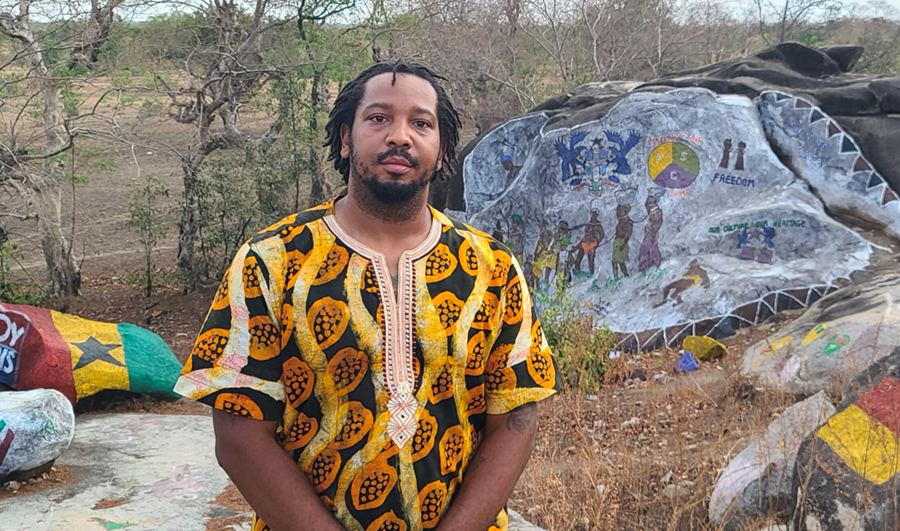Environmental Dynamics doctoral student Terrius Bruce will present during the ENDY Lunchtime Lecture Series next week. Bruce will speak on "Improving Community Food Systems in the Time of COVID" at 1 p.m. Monday, Oct. 18 in Gearhart Hall room 217.
"As a consequence of COVID-19, nations across the globe are struggling with growing food insecurity," Bruce said. "This crisis offers an opportunity to review and reflect on the importance of resilience in emergencies."
Bruce will discuss the need for changes to more sustainable circular applications and will address the quality of the environment, health of workers, and regeneration of natural resources.
During the height of the COVID-19 pandemic, Bruce pursued his passions for sustainable food systems research in Ghana West Africa. The NOAA CCME scholar earned his Bachelor of Science in Environmental Studies with a minor in Agribusiness from Florida A&M University in the spring of 2020 and was active in a capacity-building grant that did not settle out due to the restraints caused by the pandemic. Instead of sitting idle, Bruce decided to return to Ghana and engage his research interests.
The love for Ghana began in Bruce's first visit in 2012, where he saw a need to apply his education and research to the advancement of the culture he connected with. When he returned to Ghana in 2020. Bruce was introduced to Operation Feed Yourself, which aimed to increase levels of food crops produced in Ghana, by Ghanaians, for domestic consumption. This fascinated Bruce and provided a historical baseline to show local residents the connection to improving food allocation and access to alleviate food insecurity. Through local partnerships, Bruce established relationships with key local players of the food system. In June, the ENDY scholar held a hybrid conference in Accra, Ghana with several distinguished local leaders in the fields of agribusiness, marketing, transportation, and retail.
Notably, Bruce acquired a 2-acre plot in the Greater Accra Region of Shai Hills. Housed adjacent to Ice Cool water factory, the farm reclaims wastewater from the plant for irrigation. It is broken up into 4 main sections including areas for composting stations, mealworm rearing, traditional farming of ancient grains for use in animal feed, chicken houses, piggery houses, aquaponic beds, and traditional farming of cash crops such as turmeric and moringa.
The Shai Hills project takes a place-based approach by engaging the local supply chain and building capacity through mixed farming practices that integrate long-term sustainability methods.
Considering the Covid-19 wake-up, the project serves as a demonstration to improve the way we look at human health and our connection to the environment. Focusing on the local systems allows citizens to enact real change by reducing and eliminating carbon emissions through nature-based carbon removal, rebuilding biodiversity, working with local suppliers to minimize shipping distances and costs.
The long-term dynamics of this project strive to create a sustainable food system that is self-funding, while lowering the entry barriers to the local food market by enhancing, growing and creating community-based jobs, streamlined services, and businesses that increase food security.
About Environmental Dynamics: An interdisciplinary program within the Graduate School and International Education, the doctoral program in Environmental Dynamics began in 1998 and aims to develop strategies for sustainable societies based on scientific research and respect for human cultures. Environmental Dynamics (ENDY) is the study of complex interactions between natural systems and human activity. It requires an interdisciplinary research approach and integration with advanced technologies. The program's focus is human-environmental interactions within recent Earth history. It stresses interdisciplinary analyses of geophysical, biological, geochemical, and socio-cultural interactions related to environmental change. The program is directed by Peter Ungar, distinguished professor of anthropology, and is staffed by faculty from nearly a dozen departments.
Topics
Contacts
Amy Unruh, director of communications
Graduate School and International Education
479-575-5809, unruh@uark.edu
